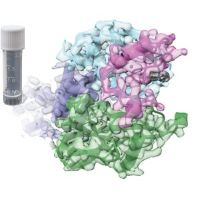Specification
| Description | Recombinant protein from the full-length sequence of homo sapiens TNF alpha induced protein 3 (TNFAIP3), transcript variant 3 (NM_006290). |
| Organism | Homo sapiens (Human) |
| Expression Host | Human Cells |
| Tag Info | His or DYKDDDDK. Please contact us if you need further information or require specific designed tag. |
| Purity | Greater than 90% by SDS-PAGE gel |
| Uniprot ID | P21580 |
| Entry Name | TNAP3_HUMAN |
| Gene Names | TNFAIP3 OTUD7C |
| Alternative Gene Names | OTUD7C |
| Alternative Protein Names | Tumor necrosis factor alpha-induced protein 3 (TNF alpha-induced protein 3) (EC 2.3.2.-) (EC 3.4.19.12) (OTU domain-containing protein 7C) (Putative DNA-binding protein A20) (Zinc finger protein A20) [Cleaved into: A20p50; A20p37] |
| Application | Antigens, Western, ELISA and other in vitro binding or in vivo functional assays, and protein-protein interaction studies; For research & development use only! |
| Buffer | Purified protein formulated in a sterile solution of PBS buffer, pH7.2, without any preservatives |
| Endotoxin | Endotoxin level is < 0.1 ng/µg of protein (<1EU /µg) |
| Length | 790 |
| Molecular Weight(Da) | 89614 |
| Protein Sequence | (The sequence of expressed protein may have some variation from the sequence shown below. Please contact us for the exact sequence.) MAEQVLPQALYLSNMRKAVKIRERTPEDIFKPTNGIIHHFKTMHRYTLEMFRTCQFCPQFREIIHKALIDRNIQATLESQKKLNWCREVRKLVALKTNGDGNCLMHATSQYMWGVQDTDLVLRKALFSTLKETDTRNFKFRWQLESLKSQEFVETGLCYDTRNWNDEWDNLIKMASTDTPMARSGLQYNSLEEIHIFVLCNILRRPIIVISDKMLRSLESGSNFAPLKVGGIYLPLHWPAQECYRYPIVLGYDSHHFVPLVTLKDSGPEIRAVPLVNRDRGRFEDLKVHFLTDPENEMKEKLLKEYLMVIEIPVQGWDHGTTHLINAAKLDEANLPKEINLVDDYFELVQHEYKKWQENSEQGRREGHAQNPMEPSVPQLSLMDVKCETPNCPFFMSVNTQPLCHECSERRQKNQNKLPKLNSKPGPEGLPGMALGASRGEAYEPLAWNPEESTGGPHSAPPTAPSPFLFSETTAMKCRSPGCPFTLNVQHNGFCERCHNARQLHASHAPDHTRHLDPGKCQACLQDVTRTFNGICSTCFKRTTAEASSSLSTSLPPSCHQRSKSDPSRLVRSPSPHSCHRAGNDAPAGCLSQAARTPGDRTGTSKCRKAGCVYFGTPENKGFCTLCFIEYRENKHFAAASGKVSPTASRFQNTIPCLGRECGTLGSTMFEGYCQKCFIEAQNQRFHEAKRTEEQLRSSQRRDVPRTTQSTSRPKCARASCKNILACRSEELCMECQHPNQRMGPGAHRGEPAPEDPPKQRCRAPACDHFGNAKCNGYCNECFQFKQMYG |
Background
| Function | FUNCTION: Ubiquitin-editing enzyme that contains both ubiquitin ligase and deubiquitinase activities. Involved in immune and inflammatory responses signaled by cytokines, such as TNF-alpha and IL-1 beta, or pathogens via Toll-like receptors (TLRs) through terminating NF-kappa-B activity. Essential component of a ubiquitin-editing protein complex, comprising also RNF11, ITCH and TAX1BP1, that ensures the transient nature of inflammatory signaling pathways. In cooperation with TAX1BP1 promotes disassembly of E2-E3 ubiquitin protein ligase complexes in IL-1R and TNFR-1 pathways; affected are at least E3 ligases TRAF6, TRAF2 and BIRC2, and E2 ubiquitin-conjugating enzymes UBE2N and UBE2D3. In cooperation with TAX1BP1 promotes ubiquitination of UBE2N and proteasomal degradation of UBE2N and UBE2D3. Upon TNF stimulation, deubiquitinates 'Lys-63'-polyubiquitin chains on RIPK1 and catalyzes the formation of 'Lys-48'-polyubiquitin chains. This leads to RIPK1 proteasomal degradation and consequently termination of the TNF- or LPS-mediated activation of NF-kappa-B. Deubiquitinates TRAF6 probably acting on 'Lys-63'-linked polyubiquitin. Upon T-cell receptor (TCR)-mediated T-cell activation, deubiquitinates 'Lys-63'-polyubiquitin chains on MALT1 thereby mediating disassociation of the CBM (CARD11:BCL10:MALT1) and IKK complexes and preventing sustained IKK activation. Deubiquitinates NEMO/IKBKG; the function is facilitated by TNIP1 and leads to inhibition of NF-kappa-B activation. Upon stimulation by bacterial peptidoglycans, probably deubiquitinates RIPK2. Can also inhibit I-kappa-B-kinase (IKK) through a non-catalytic mechanism which involves polyubiquitin; polyubiquitin promotes association with IKBKG and prevents IKK MAP3K7-mediated phosphorylation. Targets TRAF2 for lysosomal degradation. In vitro able to deubiquitinate 'Lys-11'-, 'Lys-48'- and 'Lys-63' polyubiquitin chains. Inhibitor of programmed cell death. Has a role in the function of the lymphoid system. Required for LPS-induced production of proinflammatory cytokines and IFN beta in LPS-tolerized macrophages. {ECO:0000269|PubMed:14748687, ECO:0000269|PubMed:15258597, ECO:0000269|PubMed:16684768, ECO:0000269|PubMed:17961127, ECO:0000269|PubMed:18164316, ECO:0000269|PubMed:18952128, ECO:0000269|PubMed:19494296, ECO:0000269|PubMed:22099304, ECO:0000269|PubMed:23827681, ECO:0000269|PubMed:8692885, ECO:0000269|PubMed:9299557, ECO:0000269|PubMed:9882303}. |
| Pathway | |
| Protein Families | Peptidase C64 family |
| Tissue Specificity |
QC Data
| Note | Please contact us for QC Data |
| Product Image (Reference Only) |  |

